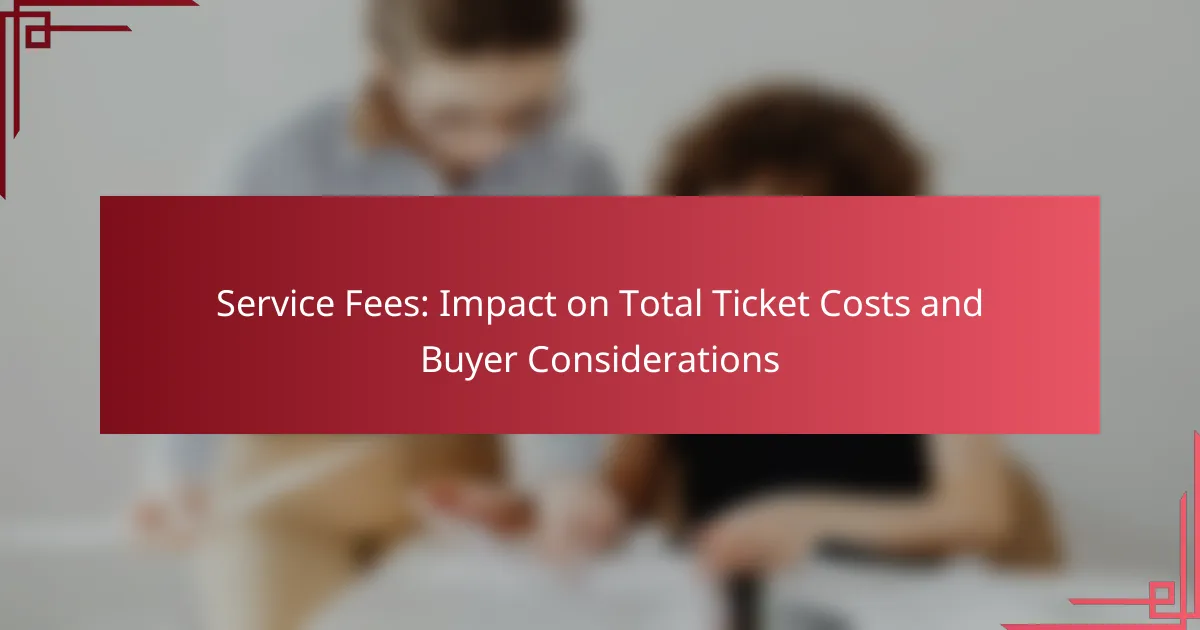Service fees can considerably inflate the total cost of tickets in the US, often adding a notable percentage to the base price. These fees, which include booking and convenience charges, vary by platform and event type, making it crucial for buyers to understand their implications on affordability. By exploring direct purchasing options and comparing prices across platforms, consumers can effectively minimize these additional costs.
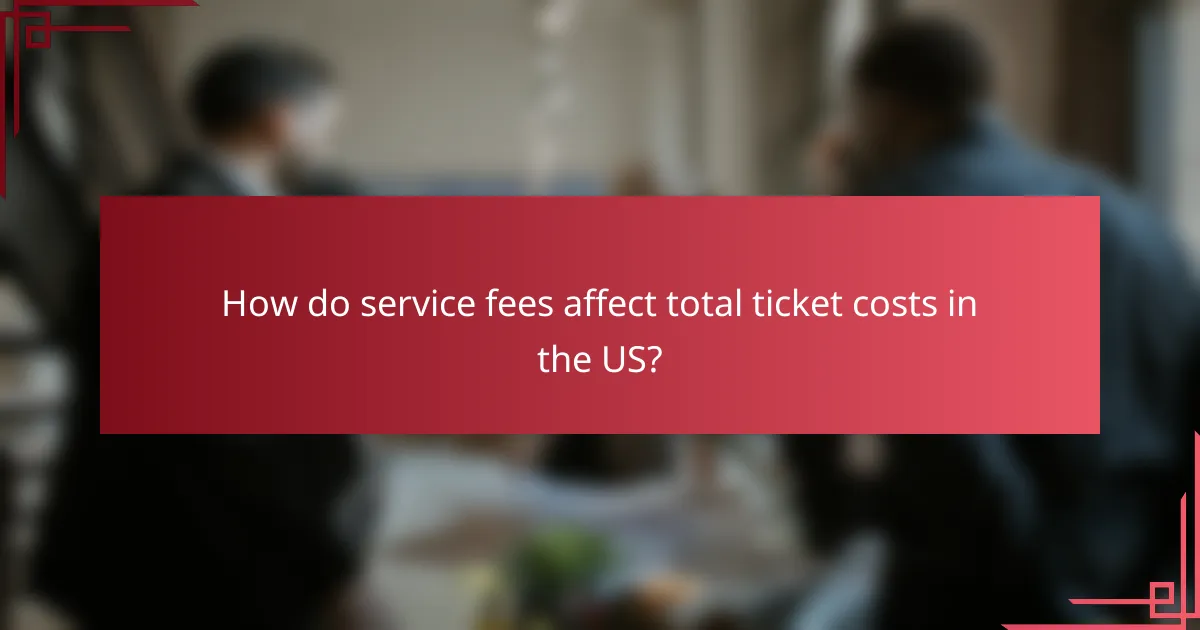
How do service fees affect total ticket costs in the US?
Service fees can significantly increase total ticket costs in the US, often adding a substantial percentage to the base price. These fees can vary widely depending on the ticketing platform and event type, impacting the overall affordability for consumers.
Increased overall expenses
Service fees typically range from a few dollars to over twenty percent of the ticket price, depending on the event and vendor. For example, a $50 concert ticket might incur an additional $10 in service fees, raising the total cost to $60. This increase can deter budget-conscious buyers and lead to unexpected expenses.
Consumers should be aware that some platforms may also charge delivery fees or processing fees, further inflating the final price. It’s essential to review the total cost breakdown before purchasing to avoid surprises.
Impact on consumer purchasing decisions
The presence of service fees can heavily influence consumer purchasing decisions, often leading buyers to seek alternatives. Many consumers compare total costs across different platforms, opting for those with lower fees or better transparency in pricing. This behavior can shift demand towards vendors that offer clearer pricing structures.
Additionally, high service fees may lead consumers to delay purchases or abandon their shopping carts altogether. To mitigate this, buyers should look for promotions or consider purchasing tickets well in advance to secure better pricing without excessive fees.
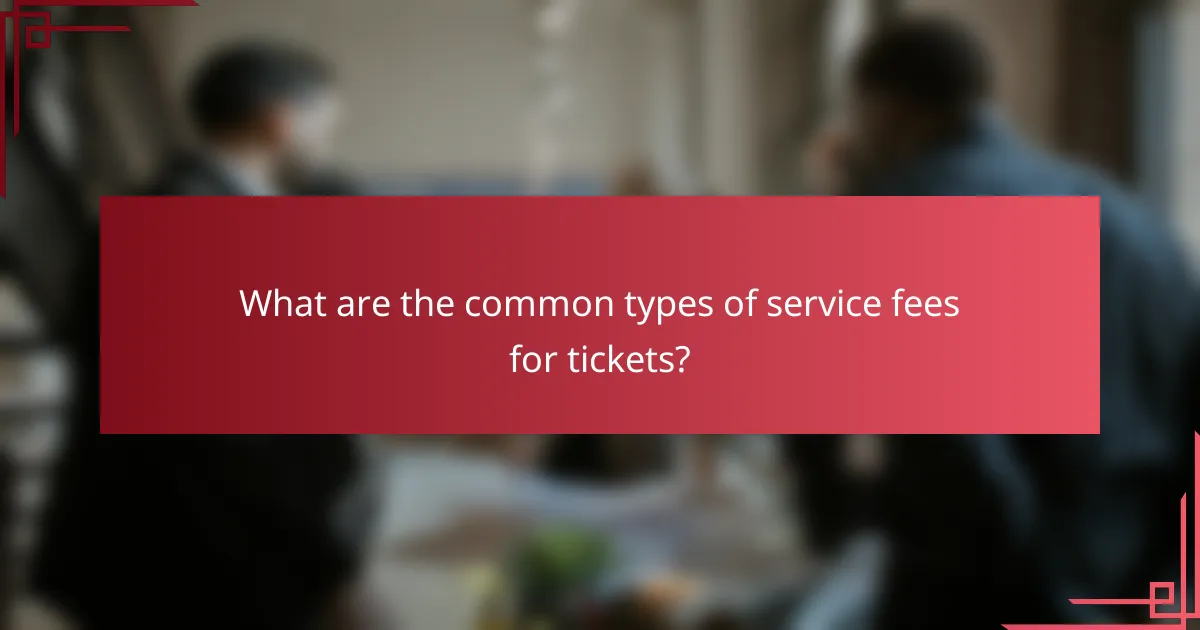
What are the common types of service fees for tickets?
Common types of service fees for tickets include booking fees and convenience fees. These charges can significantly impact the total cost of a ticket, so understanding them is essential for buyers.
Booking fees
Booking fees are charges applied when purchasing tickets, typically covering the cost of processing the transaction. These fees can vary widely, ranging from a few dollars to a percentage of the ticket price, depending on the seller and the event.
When considering booking fees, it’s crucial to compare different ticket vendors. Some platforms may advertise lower ticket prices but add higher booking fees, ultimately increasing the total cost. Always check the final price before completing your purchase.
Convenience fees
Convenience fees are additional charges for the ease of purchasing tickets online or through mobile apps. These fees can be a flat rate or a percentage of the ticket price and are often justified by the convenience of avoiding long lines or phone calls.
Buyers should be aware that convenience fees can sometimes be avoided by purchasing tickets directly at the venue box office. If you prefer online purchases, look for platforms that offer lower convenience fees or promotional discounts to minimize overall costs.
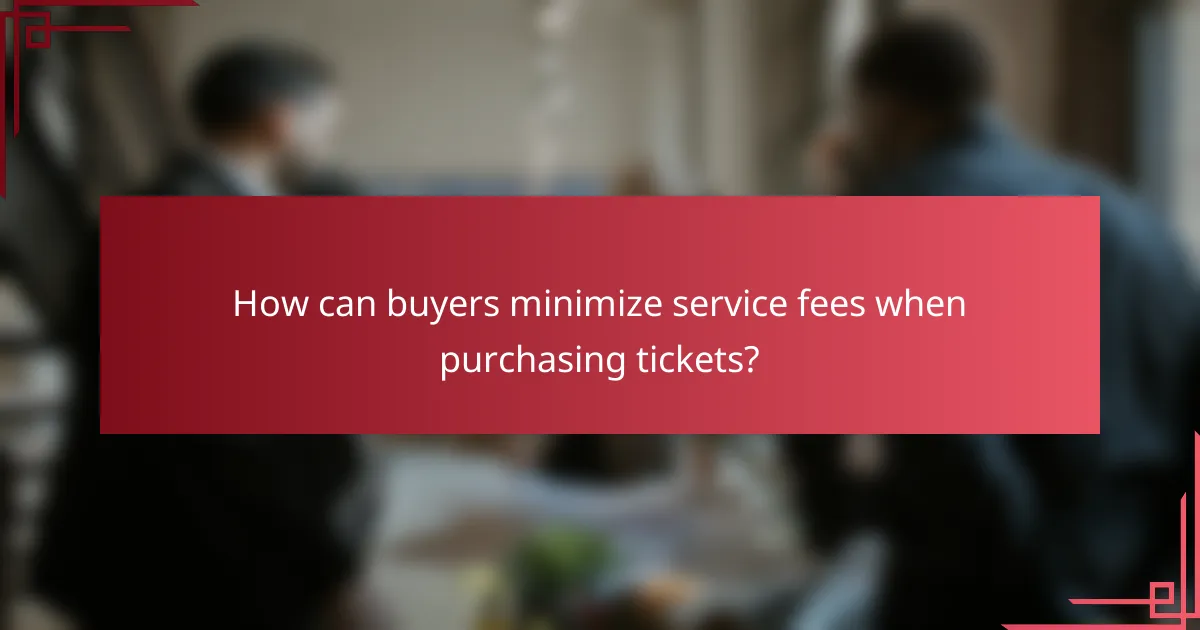
How can buyers minimize service fees when purchasing tickets?
Buyers can minimize service fees by exploring direct purchasing options and utilizing discount platforms. Understanding where to buy tickets and comparing prices can significantly reduce the overall cost.
Buy directly from venues
Purchasing tickets directly from the venue often eliminates additional service fees charged by third-party sellers. Many venues offer tickets through their official websites or box offices, which can provide a more straightforward transaction.
When buying directly, check for any exclusive promotions or discounts that may not be available elsewhere. For example, some venues may offer reduced prices for local residents or special deals for early purchases.
Utilize discount platforms
Discount platforms can help buyers find tickets at lower prices, often with reduced service fees compared to traditional ticket sellers. Websites and apps that specialize in discounted tickets can provide significant savings, especially for events with high demand.
However, it’s essential to read the terms and conditions carefully, as some discount platforms may still charge service fees. Look for platforms that clearly outline their pricing structure and offer transparent information about any additional costs.
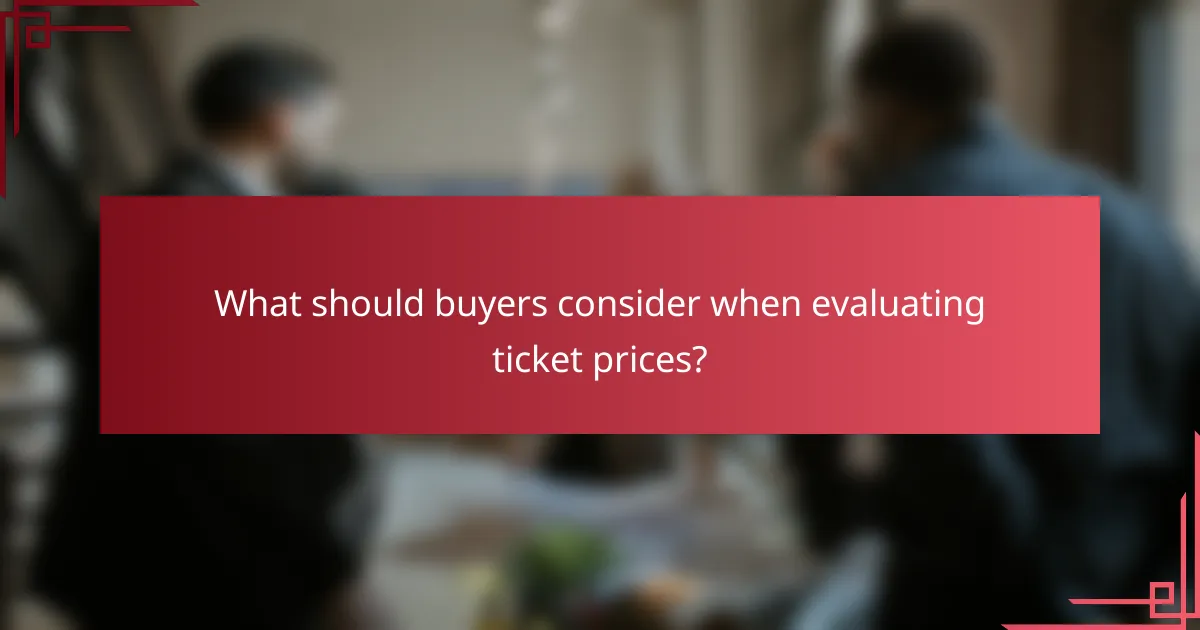
What should buyers consider when evaluating ticket prices?
Buyers should consider the total cost of tickets, including service fees, when evaluating prices. Understanding how these fees affect the overall price can help buyers make informed decisions and avoid unexpected expenses.
Comparison of total costs
When comparing ticket prices, it’s crucial to look at the total cost, which includes the base price plus any additional service fees. For example, a ticket priced at $50 might end up costing $65 after including $15 in fees. This discrepancy can significantly impact your budget, especially for larger groups or multiple events.
Buyers should create a simple comparison chart to evaluate total costs across different vendors. This can help identify the best deal and ensure that you are not misled by lower base prices that come with high fees.
Understanding fee structures
Service fees can vary widely depending on the ticket seller and the type of event. Common fees include processing fees, delivery charges, and convenience fees, which can add anywhere from a few dollars to a significant percentage of the ticket price. Understanding these structures can help you anticipate the final cost before making a purchase.
To avoid surprises, always read the fine print associated with ticket purchases. Some platforms may advertise low base prices but have high service fees, while others may offer more transparent pricing. Knowing how to spot these differences can save you money and frustration.
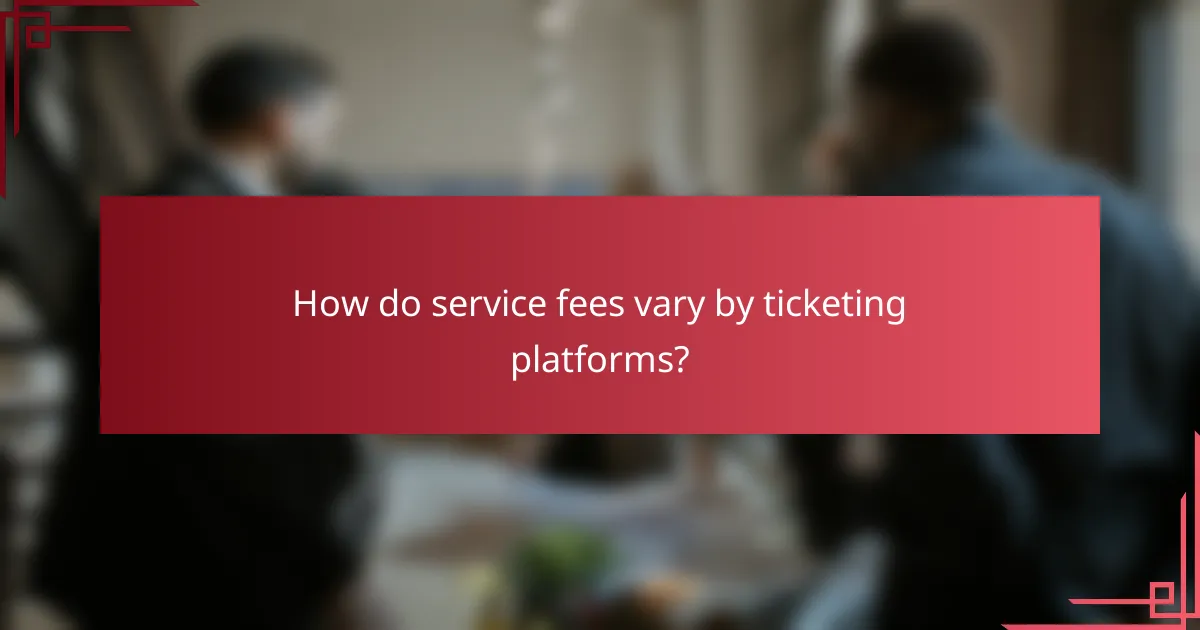
How do service fees vary by ticketing platforms?
Service fees can significantly differ across ticketing platforms, impacting the total cost of tickets. Factors such as the platform’s pricing model, the event type, and the seller’s policies contribute to these variations.
Ticketmaster fee structures
Ticketmaster typically employs a tiered fee structure that includes both a service fee and a facility charge. The service fee can range from a few dollars to over 20% of the ticket price, depending on the event and seat location.
For example, a $100 ticket might incur a service fee of $10 to $20, while premium seats could attract higher fees. Buyers should always check the final price before purchasing to avoid surprises.
Live Nation service charges
Live Nation’s service charges often mirror those of Ticketmaster, as both companies are part of the same parent organization. Service fees can vary widely, typically falling between 10% to 25% of the ticket price.
When purchasing through Live Nation, it’s advisable to compare the total cost across different platforms. This can help identify the best deal, especially for popular events where fees can add up quickly.
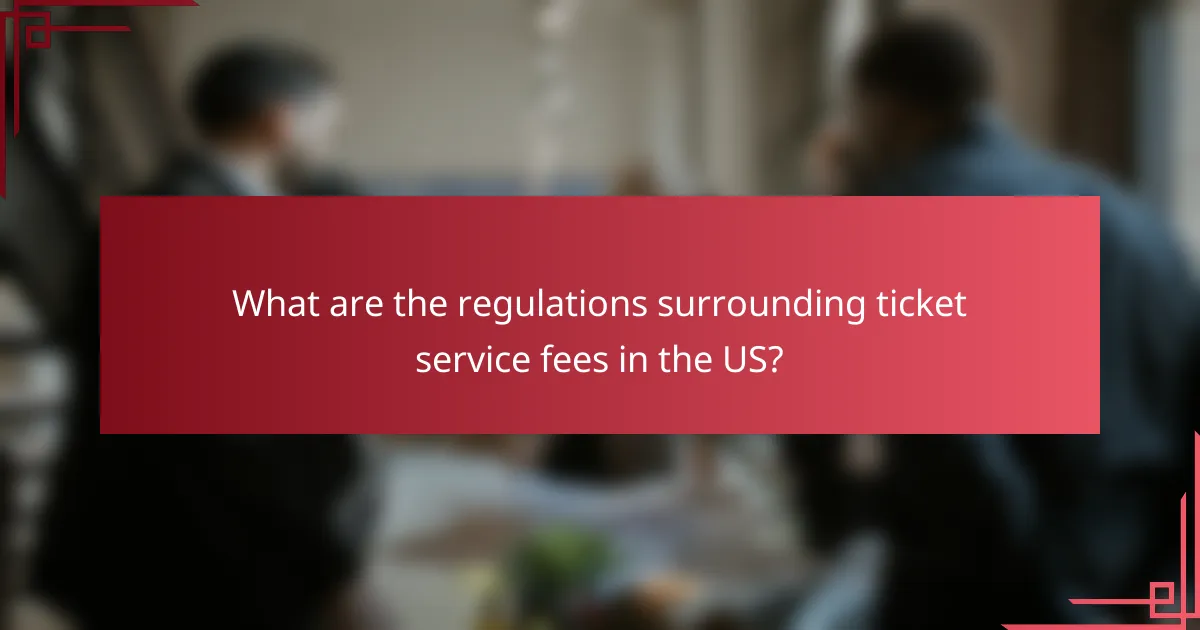
What are the regulations surrounding ticket service fees in the US?
In the US, regulations on ticket service fees vary by state and can significantly impact the total cost of tickets. These fees, often added by ticket sellers, must comply with specific state laws aimed at ensuring transparency and fairness for consumers.
State-specific laws
Many states have enacted laws that require ticket sellers to disclose service fees upfront. For instance, California mandates that all fees be included in the advertised ticket price, while New York requires clear disclosure of any additional charges before the purchase is completed. These regulations help consumers make informed decisions and avoid unexpected costs.
Some states also impose limits on the amount that can be charged as service fees. For example, in certain jurisdictions, fees may not exceed a specific percentage of the ticket price, ensuring that consumers are not overcharged. It’s essential for buyers to check local laws to understand their rights regarding service fees.
Consumer protection measures
Consumer protection measures related to ticket service fees include the right to refunds and the ability to report unfair practices. Many states have established agencies that oversee ticket sales and can assist consumers in resolving disputes over excessive fees. Buyers should familiarize themselves with these resources to protect their interests.
Additionally, some states require ticket sellers to provide clear information about their fee structures, including how fees are calculated and what services they cover. This transparency is crucial for consumers who want to compare prices effectively and avoid hidden charges. Always read the fine print before purchasing tickets to ensure you understand all associated costs.
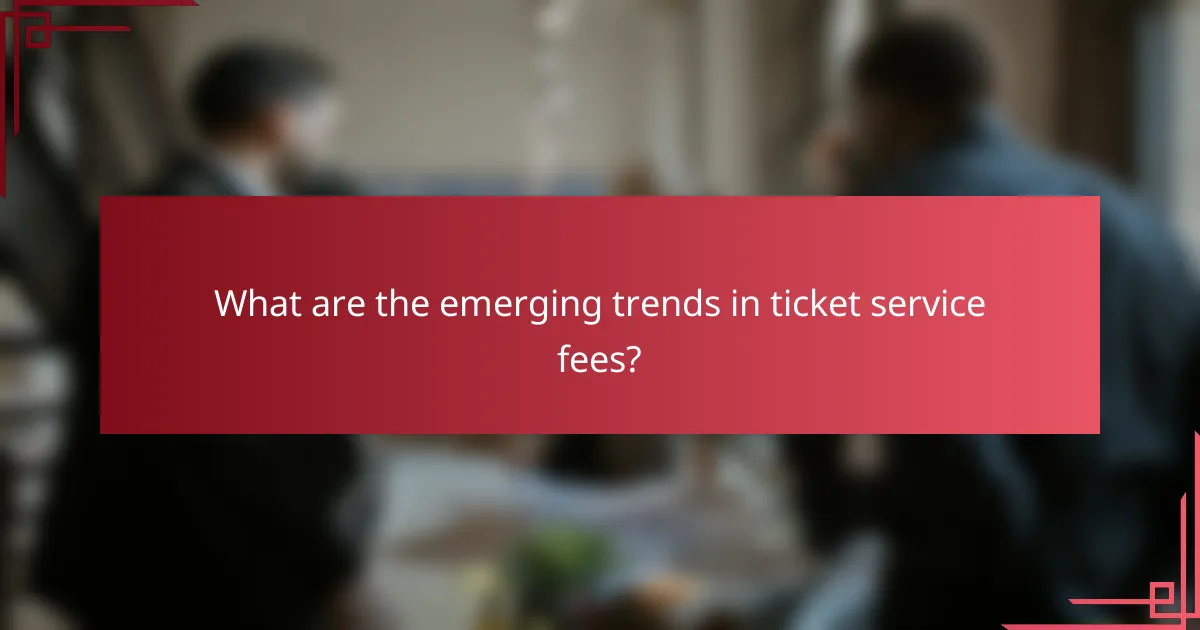
What are the emerging trends in ticket service fees?
Emerging trends in ticket service fees include increased transparency, dynamic pricing models, and the rise of service fee caps. Buyers are becoming more aware of these fees, which can significantly impact the total cost of tickets.
Increased Transparency in Fees
Many ticket vendors are now providing clearer breakdowns of service fees, allowing buyers to see exactly what they are paying for. This trend helps consumers make informed decisions and compare total costs across different platforms.
For instance, some platforms now display the base ticket price alongside the service fees upfront, rather than adding them at checkout. This shift encourages competition among sellers to offer more attractive pricing structures.
Dynamic Pricing Models
Dynamic pricing is becoming more prevalent, where ticket prices fluctuate based on demand, time, and availability. This model can lead to lower prices during off-peak times but may result in higher costs during popular events.
Buyers should monitor ticket prices over time and consider purchasing during promotional periods to avoid inflated costs. Setting alerts on ticketing platforms can help track price changes effectively.
Service Fee Caps
Some regions are implementing regulations that cap service fees to protect consumers from excessive charges. For example, in certain European countries, legislation limits the percentage of service fees relative to the ticket price.
Buyers should be aware of local regulations regarding service fees, as these can vary significantly. Understanding these caps can help consumers advocate for fair pricing when purchasing tickets.
